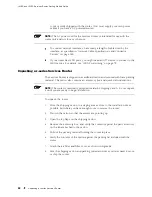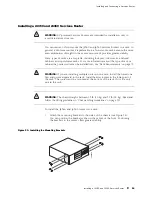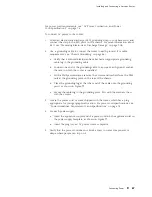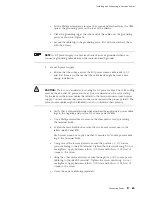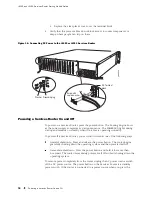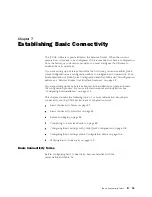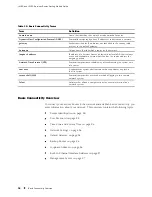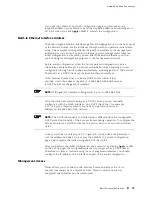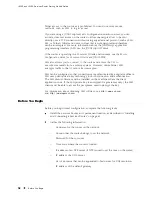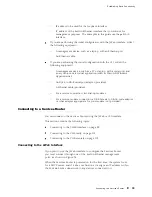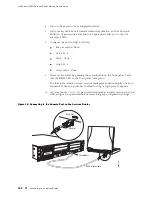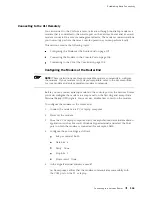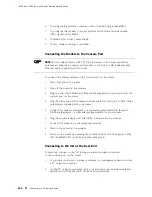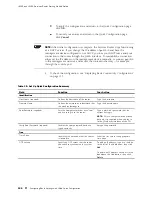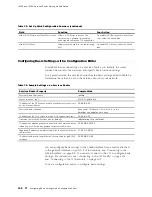
J4350 and J6350 Services Router Getting Started Guide
For Common Criteria compliance, you must configure NTP to provide accurate
timestamps for system log messages. For more information, see the
Secure
Configuration Guide for Common Criteria and JUNOS-FIPS
.
Network Settings
A Domain Name System (DNS) server on the network maintains a database for
resolving hostnames and IP addresses. Network devices can query the DNS server
by hostnames rather than IP addresses. The router accesses the DNS servers that are
added to the configuration to resolve hostnames in the order in which you list them.
If you plan to include your router in several domains, you can add these domains to
the configuration so that they are included in a DNS search. When DNS searches
are requested, the domain suffixes are appended to the hostnames.
Default Gateway
A default gateway is a static route that is used to direct packets addressed to
networks not explicitly listed in the routing table. If a packet arrives at the
Services Router with an address that the router does not have routing information
for, the router sends the packet to the default gateway. The default gateway
entry is always present in the routing and forwarding tables.
Backup Router
You can specify a backup router to take over when the routing protocol process
of the Services Router is not running, usually when the Services Router is
booting, or if its routing protocol process has failed. Packets arriving at a
Services Router in this situation are routed to the backup router. When the
routing protocol process starts up again, the address of the backup router is
removed from the routing and forwarding tables of the Services Router. The
backup router must be located on the same subnet.
NOTE:
To configure a backup router, you must use the CLI or J-Web configuration
editor. You cannot configure a backup router with J-Web Quick Configuration.
Loopback Address
The loopback address is the IP address of the Services Router. The loopback
address ensures that the Services Router provides an IP address to management
applications. Because it must always be available to hosts attempting to route
packets to the Services Router, the loopback address resides on an interface that
is always active, known as the loopback interface (
lo0.0
). Setting a loopback
address ensures that the Services Router can receive packets addressed to the
loopback address as long as the router is reachable though any entry (ingress)
interface. In addition, applications such as NTP, RADIUS, and can use
the loopback address as the source address for outgoing packets.
96
Basic Connectivity Overview
Summary of Contents for J4350
Page 14: ...J4350 and J6350 Services Router Getting Started Guide xiv Table of Contents...
Page 22: ...2 J series Overview...
Page 68: ...J4350 and J6350 Services Router Getting Started Guide 48 Field Replaceable PIMs...
Page 75: ...Services Router User Interface Overview Figure 25 J Web Layout Using the J Web Interface 55...
Page 88: ...J4350 and J6350 Services Router Getting Started Guide 68 Using the Command Line Interface...
Page 90: ...70 Installing a Services Router...
Page 100: ...J4350 and J6350 Services Router Getting Started Guide 80 Site Preparation Checklist...
Page 112: ...J4350 and J6350 Services Router Getting Started Guide 92 Powering a Services Router On and Off...
Page 144: ...J4350 and J6350 Services Router Getting Started Guide 124 Verifying Secure Web Access...
Page 162: ...142 Maintaining Services Router Hardware...
Page 194: ...J4350 and J6350 Services Router Getting Started Guide 174 Troubleshooting Hardware Components...
Page 204: ...184 J series Requirements and Specifications...
Page 220: ...J4350 and J6350 Services Router Getting Started Guide 200 ISDN RJ 45 Connector Pinout...
Page 267: ...Part 5 Index Index 247...
Page 268: ...248 Index...

